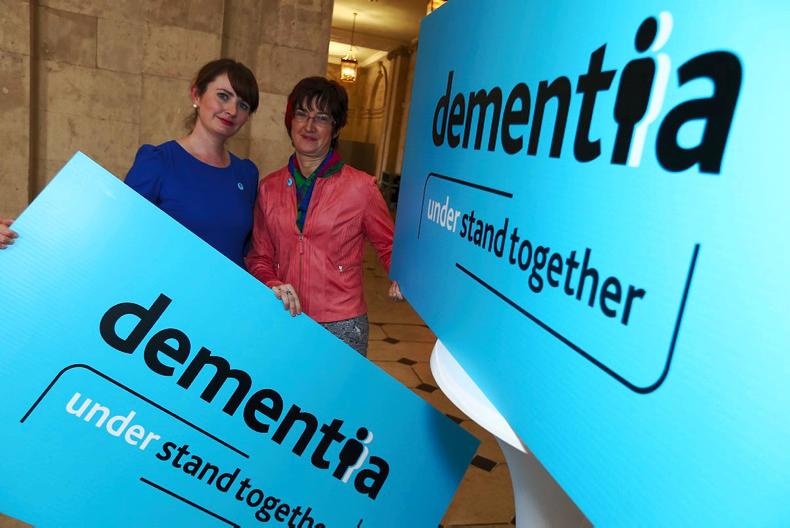Over the age of 50, most people fear getting dementia – not cancer. But under 50 most people fear getting cancer,” says Brian Lawlor, a professor at Trinity College Dublin and a consultant psychiatrist at St James’ Hospital. “People see dementia almost like the kiss of death,” continues Brian, but he notes that “when you dig a bit deeper, people don’t fully understand what dementia is and what is isn’t”.
He says people are usually focused on the end stage of the disease “and I think that’s an image that they can become preoccupied with and focused on and they don’t appreciate what a good quality of life they can have for quite a long period of time.”
This lack of understanding on the part of the general population about dementia is the crux of the main issue around the disease. Brian says that if those with dementia have more support and more understanding, they can have quite a full life. However, he feels: “The lay public doesn’t really understand that, and they don’t really know how to deal and relate to people with dementia.”
This is why the Dementia Understand Together campaign has been launched. It aims to inspire people to stand together with the 500,000 Irish people whose families have been affected by dementia.
This campaign stems from a national dementia strategy published in 2014, which identified a lack of knowledge and awareness around dementia in general in Ireland.
One of the key points identified in the strategy was that an information and education programme would be very helpful – both for those with dementia – and for the population at large.
The reason a lack of understanding poses such a problem, according to National Dementia Campaign Manager Nicola Donnelly, is that: “If people don’t understand it, they tend not to engage with those with dementia and that leaves people feeling very lonely and isolated.”
Brian expands on this, saying that when a person develops dementia and has, for example, memory difficulties or a problem with their own speaking, they may get embarrassed and withdraw.
“So you’ve two things going on here: the stigma, the fear: ‘I can’t really relate to the person. I can’t treat them as a friend anymore.’ Then on the other hand the person with dementia is feeling under pressure. They feel embarrassed, their natural tendency is to stick their head in the sand and withdraw.
“These two forces kind of make people push one another away in a sense. Both are due to fear, and I think that’s what we’re trying to overcome. So you and I, if we understand more about dementia, are less fearful of it. Doing something small, reaching out can make a huge difference,” says Brian.
A particular problem for those with dementia in rural areas is not being able to drive. This can lead to their becoming more isolated and lonely. Brian advises not to be afraid to “visit and maybe to bring people out if they’re not able to get out themselves anymore”.
He also notes that although people might have memory impairment, or difficulty with people’s names: short-term memory problems, “their emotions are usually still quite intact”. “They can talk about things that have happened in the past: their knowledge memory is still quite intact.”
Nicola Donnelly notes: “This is about your brother, your sister, your mother, your father, your friend who is in the book club with you, your friend that is in bingo with you. These are real-life people – your friends and your loved ones – and they deserve support, compassion and understanding.”
Brian Lawlor concludes: “What we’re trying to do is increase knowledge and awareness of what dementia is and change attitudes about the disease so that people with dementia are more widely accepted by and engaged in society.”CL
>> Living well with dementia
ays to help your memory
Try using lists (reminders, to-do lists, checklists for going out or going to bed) or set up a calendar or wall chart to remind you of dates and times. If you take medication, handy organisers can help you keep track.
Tips for communicating
Dementia can affect how you take part in conversations and how you express yourself. Sometimes telling people you’re having difficulty finding worlds or asking someone to repeat themselves can help. Names can be hard to recall. You could practice saying someone’s name – or maybe taking a note of new names. Be aware of what surroundings suit you and consider meeting people somewhere familiar, perhaps quiet or without background noise.
Using equipment and technology
Don’t be daunted by equipment and technology. They can help you live more independently, and the correct supports will be easy to use and manage. You can find out more from an occupational therapist (your doctor or public health nurse can help you), from Assist Ireland or from The Alzheimer Society on their national helpline (1800 341 341 or email helpline@alzheimer.ie).







SHARING OPTIONS